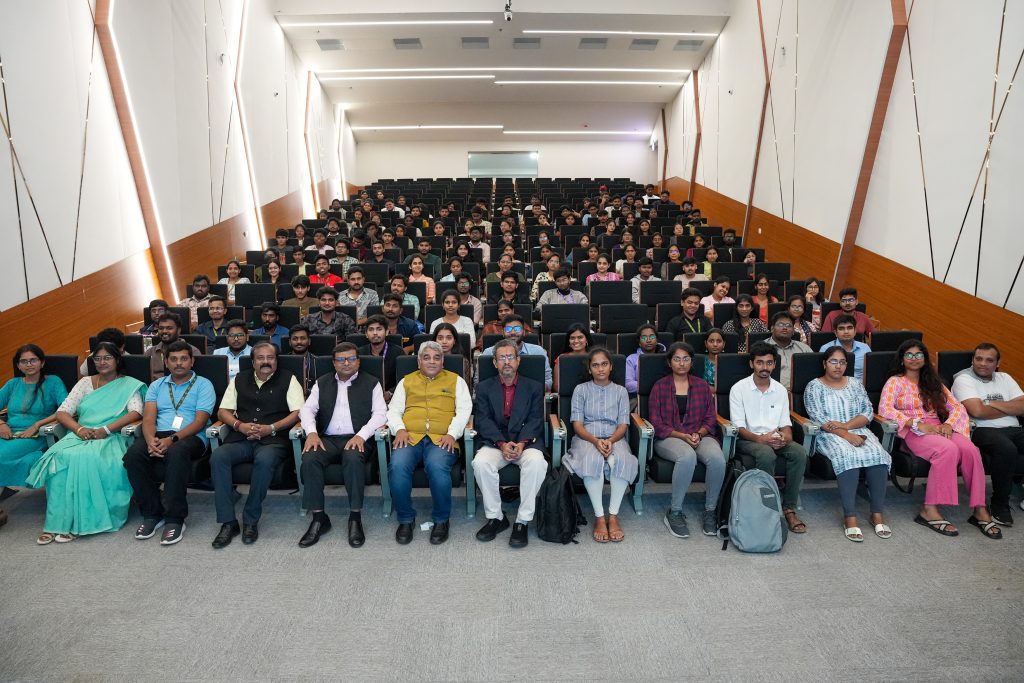Current Happenings
- Marketing Wizard Delivers Lecture on D2C Marketing September 30, 2024
 The students of Paari School of Business (PSB) had a memorable experience when Mr Siddesh Joglekar joined as a guest lecturer at SRM University-AP. The CRCS team’s dedicated efforts and the unwavering support of Prof. Bharadwaj Sivakumaran, Dean of PSB, made this unique opportunity possible. Students had the privilege of engaging in a personal interaction with the esteemed guest on September 18, 2024.
The students of Paari School of Business (PSB) had a memorable experience when Mr Siddesh Joglekar joined as a guest lecturer at SRM University-AP. The CRCS team’s dedicated efforts and the unwavering support of Prof. Bharadwaj Sivakumaran, Dean of PSB, made this unique opportunity possible. Students had the privilege of engaging in a personal interaction with the esteemed guest on September 18, 2024.During the lecture Mr Joglekar shed light on various aspects of professional growth and marketing strategies. He placed significant emphasis on the need to foster a collaborative environment and recognising the contributions of peers.The lecture also delved into the imporatance of networking for career advancement, especially through ones’ Alumni Associations
Mr Joglekar delved into the expansive potential of Direct to Consumer (D2C) marketing, using examples from renowned companies like Twitter, Walmart, Instagram, Zomato, Amazon, Tesla, and Google to illustrate the evolution of brand images. A poignant quote from Mr Joglekar, “Companies are transformed into brands by people who dare to dream,” encapsulated the essence of the discussion, emphasising the role of visionary individuals in shaping successful brands.
Interactive elements were woven into the session, including an activity where students were tasked with creating logos that branded themselves, thus reflecting a unique aspect of their identity. This hands-on approach not only made the learning process engaging but also provided practical insights into branding.
A comparative analysis between traditional retail and D2C highlighted key differences such as distribution channels, pricing strategies, and brand control, offering a deeper understanding of the contemporary marketing landscape. The concepts of Customer Acquisition Cost (CAC) and Life-Time Value (LTV) were also explored, underscoring their importance in building a strong brand identity.
As the session neared its conclusion, Mr Joglekar introduced an innovative activity that involved reverse engineering an advertisement concept, inspired by the 2022 ad campaign featuring Mr Neeraj Chopra for Cred. This exercise prompted students to think creatively and apply the concepts discussed in a practical context.
The session wrapped up with a Q&A segment, where discussions ranged from market profitability to the advantages of D2C marketing, allowing for a comprehensive review of the topics covered. Ms Andrea Benedict extended a vote of thanks on behalf of the student fraternity of PSB, culminating in a group photo session that captured the essence of the enriching experience.
Continue reading → - Leadership Insights: Navigating the Future with Paari School of Business September 18, 2024
 Paari School of Business’s “Insights and Perspectives” initiative featured an interactive discussion with three domain experts: Prof. Bharadhwaj Sivakumaran, Dean of PSB; Mr Shivendra Gupta, MD & CEO of Business Standard Private Ltd; and Mr Sachin Phaniskar, Chief Operating Officer of Business Standard Private Ltd, engaging with luminaries.
Paari School of Business’s “Insights and Perspectives” initiative featured an interactive discussion with three domain experts: Prof. Bharadhwaj Sivakumaran, Dean of PSB; Mr Shivendra Gupta, MD & CEO of Business Standard Private Ltd; and Mr Sachin Phaniskar, Chief Operating Officer of Business Standard Private Ltd, engaging with luminaries.The event aimed to offer practical leadership guidance and valuable insights for professional development from experienced personnel in the academic and corporate sectors. The initiative facilitated discussions with prominent figures to emphasise the importance of improving decision-making skills, interpersonal abilities, and technological proficiency. Participants were urged to seize opportunities for growth, leverage their strengths, work on areas needing improvement, and adopt a forward-thinking mindset. Additionally, the conversation highlighted key leadership principles, including effective delegation, creating a lasting impact, and turning challenges into strategic advantages.
Participants were also encouraged to focus on long-term goals, experience the complete lifecycle of projects, and understand the value of delegation and legacy-building in leadership. The conversation highlighted key themes such as turning challenges into opportunities, understanding the difference between ideation and business execution, and the importance of humility in achieving success. Overall, the event provided attendees with practical takeaways to apply in their leadership journey and a deeper understanding of the evolving demands in today’s business landscape.
Continue reading →


















